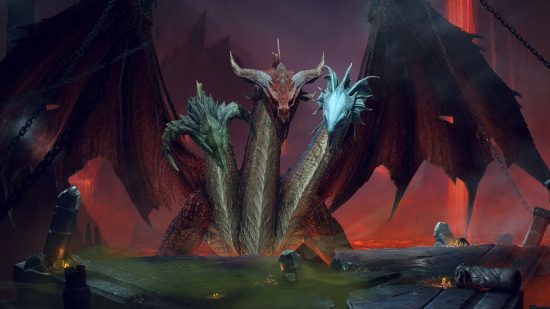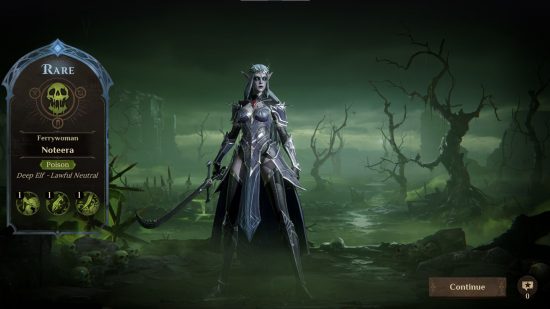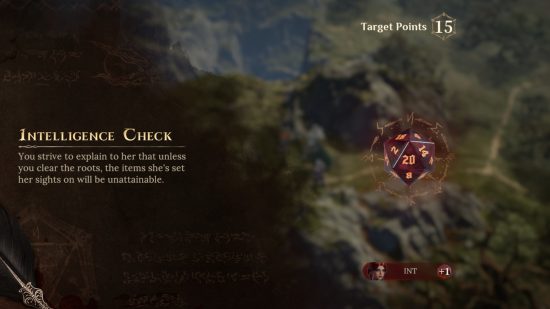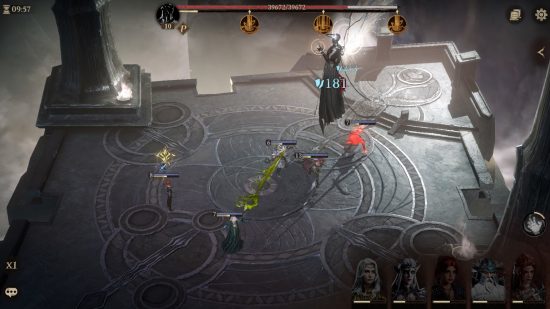Our Verdict
Dragonheir: Silent Gods is an expansive fantasy RPG that’s probably the closest thing we’ll get to Baldur’s Gate 3 on mobile for quite some time. It’s got hundreds of unique characters, a deep story, and tons of dungeons to explore. Just don’t expect too much from the combat.
It might just be because there are so many great games coming out on Switch and mobile recently that I hadn’t even heard about Dragonheir: Silent Gods until about a month ago. Which, quite frankly, confused me as a pretty enthusiastic Dungeons and Dragons fan. Well, more accurately I’m someone who would love to play D&D again someday but can’t seem to find the time or a group of people, so I listen to podcasts instead.
Understandably I jumped at the chance to get my hands on Dragonheir: Silent Gods a little early and sink my teeth in for this review. I think the best comparison I can draw to get the ball rolling and contextualize this game for you is that it’s like free-to-play mobile Baldur’s Gate 3 for the fantasy roleplaying initiate.
Me and Dragonheir initially got off on the wrong foot. Having seen all of the hype and let’s plays around Baldur’s Gate 3 (plus all the great content over on Wargamer like their Baldur’s Gate 3 review) I was excited to start creating my very own fantasy insert for this new universe. Sadly, Dragonheir’s extremely limited character creator left me wanting a lot more. There’s only four races to choose from, which appear to be gender-locked, and only about six hairstyles for each. This left me with a sour taste in my mouth as I continued playing.
Now that I’ve put a decent chunk of time into this RPG, I understand why the character creator is like this. While Dragonheir shares high fantasy elements and dice rolls with D&D, it’s a hero-based gacha game at heart. Your player character is pretty good in the early game, much like Genshin Impact’s Traveler, but you’re not really expected to invest in them in the long run. With over 200 heroes of varying elements, rarities, roles, and races, it makes complete sense that your starter character is very dull.
One thing that Dragonheir: Silent Gods really succeeds at is onboarding the player. Gacha games like this one tend to have a myriad of features and menus that, to a new player, can be extremely overwhelming. Dragonheir gradually introduces these menus to you as you progress through the story, letting you get to grips with the basics of navigation, combat, and character leveling first. I can only imagine that the number of features will increase over the years, so this slow introduction is likely to be even more beneficial to new players down the line.
The game’s story is… interesting. Fantasy stories tend to be convoluted, filled with unknown terms that you’ll become familiar with over time, but Dragonheir’s prologue was particularly hard to follow. The fully-voiced dialogue definitely helped with my immersion and, in my opinion, the game as a whole gets miles better once you begin the first chapter on the material plane, but I found it hard to get invested in the overarching plot.
Despite my issues with the storytelling aspects of the prologue, it does a great job of introducing you to your initial cast of characters, combat mechanics, and how to navigate the overworld. These starting units are decent too. I’m particularly fond of Heksandra, a poison-type caster with healing abilities.
The combat on the other hand is not really for me. The majority of encounters take place on a grid, with your team occupying one side and the enemy forces occupying the other. Occasionally you get sieged, meaning the enemy has some forces in your back line too. Combat basically consists of positioning your heroes before the fight, and then pressing play. You only get involved to cast their ultimate abilities, but even that can be set to auto. I’m not sure what it is about this style of combat that bores me – it might be the lack of involvement or the top-down perspective, but I can see how this more idle style could appeal to other players. It runs really well apart from the occasional crunchy-looking ultimate animation, so this mostly comes down to personal preference.
Dragonheir: Silent Gods certainly gives you a lot to do. Between the main story, daily commissions, side quests, and dungeon crawling, you’re unlikely to run out of content quickly. There are even some game modes with slightly different combat systems (although still based on the rectangular grid) like a tower defense-style mission and a wave-based timed challenge. If you’re looking for a fantasy game to play, you’re likely to find at least one feature that you love in this one.
All-in-all, Dragonheir: Silent Gods is a pretty impressive mobile fantasy RPG, with a massive world to explore, hundreds of heroes to level up and bond with, and plenty of avenues for both single-player and co-op fun. I’m not entirely sure that it’s for me, but I’m glad I was able to give it a go and dip my toes back into the world of high fantasy without forking out for a new gaming PC or PS5 to play Baldur’s Gate 3.
If you’re already playing Dragonheir and need some help buffing your party to beat the next boss, check out our handy list of Dragonheir: Silent Gods codes. We’ve also got a list of the best dragon games to help you live your best wyvern life or a Call of Dragons tier list for some extra help in another popular dragon game.



